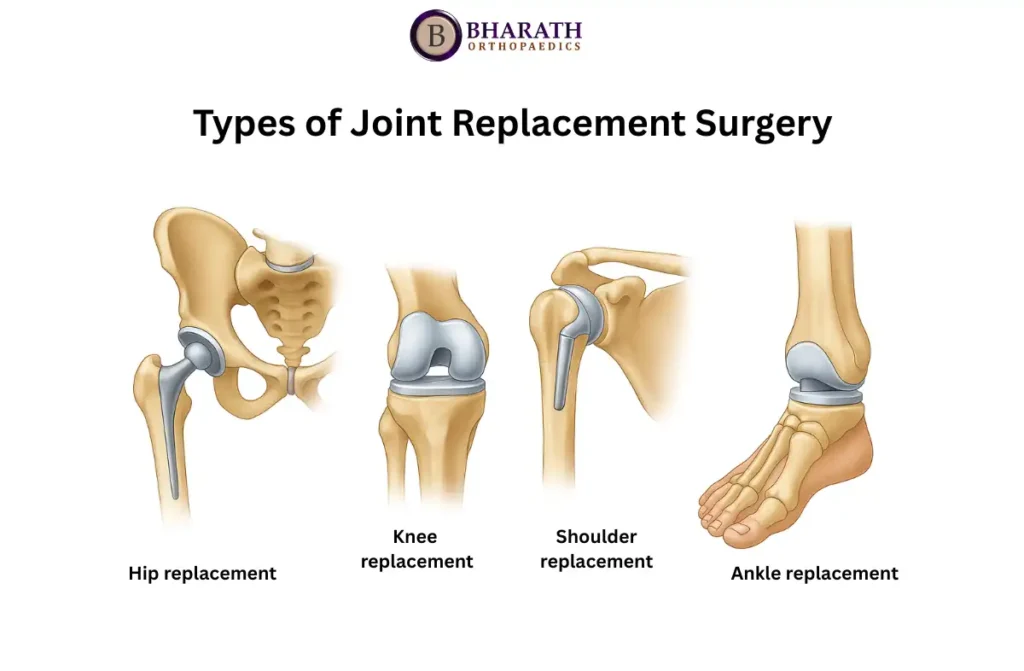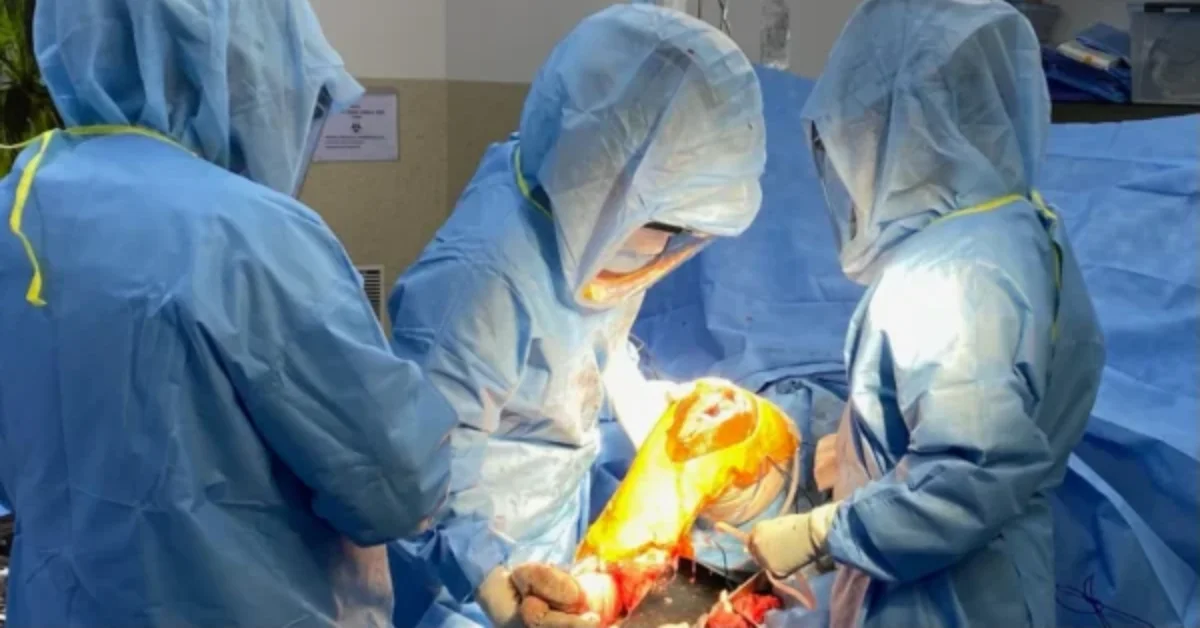Joint replacement surgery is a specialized medical procedure designed to replace damaged or worn-out joints with artificial implants. It is commonly performed on the knee, hip, shoulder, and elbow for patients affected by severe arthritis, joint injuries, or long-standing degenerative conditions. With expert orthopaedic care and modern surgical techniques, joint replacement surgery in Chennai helps patients regain mobility, reduce pain, and improve overall quality of life, allowing a return to daily activities with greater independence.
What is Joint Replacement Surgery?
Joint replacement surgery in Chennai involves removing damaged joint surfaces and replacing them with prosthetic components made of metal, plastic, or ceramic. The goal is to restore joint function, relieve chronic pain, and improve mobility when non-surgical treatments fail.
Patients often ask, “What is the treatment for knee joint pain?” Mild to moderate knee pain may respond to medications, physiotherapy, or injections. However, for severe arthritis or joint damage, joint replacement in Chennai becomes the most effective long-term solution.
The procedure typically includes:
- Preoperative evaluation and planning
- Removal of damaged cartilage and bone
- Implantation of artificial joint components
- Postoperative rehabilitation for optimal recovery

Types of Joint Replacement Surgeries
There are several types of joint replacement procedures, each tailored to the affected joint. Chennai hospitals specialize in:
- Total Hip Replacement Surgery
- Designed for patients with severe hip arthritis or fractures.
- Involves replacing the hip joint with a prosthetic implant for pain-free mobility.
- Patients may refer to Hip Pain Exercises To Avoid to protect the new joint during recovery.
- Designed for patients with severe hip arthritis or fractures.
- Total Knee Replacement Surgery
- Ideal for severe osteoarthritis or knee joint deterioration.
- Damaged cartilage and bone are replaced with metal or plastic components.
- Knee Joint Replacement
- Ideal for severe osteoarthritis or knee joint deterioration.
- Shoulder Replacement Surgery
- Recommended for arthritis, fractures, or rotator cuff damage.
- Restores strength and range of motion in the shoulder joint.
- Recommended for arthritis, fractures, or rotator cuff damage.
- Elbow Replacement Surgery
- Performed for arthritis, trauma, or joint deformities.
- Helps restore daily functional movements like lifting and bending.
- Performed for arthritis, trauma, or joint deformities.
Patients can consult specialists to determine the most suitable option. A detailed discussion of Types of Joint Surgery ensures that the chosen procedure aligns with their specific condition and lifestyle needs.
Benefits of Joint Replacement Surgery in Chennai
- Pain Relief: Chronic joint pain is significantly reduced after surgery, allowing patients to return to normal life.
- Improved Mobility: Replacing worn-out joints restores movement, making activities like walking, climbing stairs, and bending easier.
- Enhanced Quality of Life: By alleviating pain and improving joint function, patients can enjoy a more active and independent lifestyle.
- Long-Term Solution: Modern joint implants are designed to last many years, providing a sustainable solution for chronic joint issues.
- Reduced Medication Dependency: Successful joint replacement can reduce the need for painkillers, lowering the risk of long-term medication side effects.
- Better Mental Health: Relief from chronic pain often results in improved mood, reduced anxiety, and overall psychological well-being.
For effective recovery, patients should combine surgery with expert guidance, including Best Physiotherapy services in Chennai, which ensures safe and structured rehabilitation.
Risks and Considerations
While generally safe, joint replacement surgery carries some risks:
- Infection at the surgical site
- Blood Clots (DVT or pulmonary embolism)
- Implant Wear or Loosening over time
- Nerve or Blood Vessel Injury
- Pain and Swelling during recovery
- Anesthesia Complications
Discussing these risks with your orthopedic surgeon is essential to ensure informed decision-making.
Preparing for Joint Replacement Surgery
Proper preparation improves outcomes and minimizes risks. Key steps include:
- Medical Evaluation: Comprehensive assessment including blood tests, imaging studies, and medical history review.
- Physical Therapy: Pre-surgery exercises strengthen surrounding muscles, aiding faster recovery.
- Medication Review: Discuss all medications with your doctor; some may need to be paused before surgery.
- Lifestyle Changes: Stop smoking, limit alcohol, and manage weight to reduce surgical risks.
- Home Preparation: Organize a recovery-friendly environment with easy access to essential items.
- Patient Education: Understand post-surgical rehabilitation and follow instructions for joint care.
For those specifically preparing for hip surgery, learning how to prepare for total hip replacement surgery can provide valuable guidance for preoperative and postoperative care.
Procedures Followed in Different Types of Joint Replacement Surgeries
Joint replacement surgery in Chennai is performed using precise surgical techniques to ensure the best outcomes:
- Anesthesia – General or spinal anesthesia is administered for patient comfort.
- Incision and Removal – The surgeon removes damaged bone and cartilage from the joint.
- Implant Insertion – Prosthetic components made of metal, plastic, or ceramic are placed to replicate natural joint movement.
- Closure – Incisions are sutured, and initial recovery begins under medical supervision.
Advanced techniques, including minimally invasive procedures and computer-assisted surgery, improve accuracy, reduce complications, and promote faster healing.

Recovery and Rehabilitation
Post-surgical recovery is gradual and requires active participation:
- Hospital Stay: Initial monitoring, pain management, and early mobility exercises.
- Physical Therapy: Regular physiotherapy sessions help restore joint strength, flexibility, and balance. Internal links: Best Physiotherapy, Stress Fracture of the Shin, Treatment for Osteoporosis
- Home Rehabilitation: Structured exercise routines and safe daily activity management aid long-term mobility.
Most patients regain functional independence within weeks, while full recovery can take several months. Consistent physiotherapy ensures lasting results and prevents complications.
Recovery
Recovery after joint replacement surgery in Chennai is a gradual process that requires careful attention to rehabilitation. The recovery timeline can vary based on the type of surgery performed:
- Initial Recovery: Immediately following the surgery, patients typically stay in the hospital for a few days for pain management and initial mobility exercises. Pain medication and physical therapy are key components.
- Physical Therapy: After the surgery, joint reconstruction surgery patients must engage in physical therapy. This is essential to restore function, build strength, and improve flexibility.
- Long-Term Rehabilitation: Full recovery can take several months, during which time patients will progressively regain the ability to perform daily activities without pain.
Adhering to the recovery plan and following medical advice ensures the success of total hip replacement surgery and enhances long-term mobility.
Long-Term Care After Joint Replacement Surgery
Proper long-term care is essential to ensure the success of joint replacement surgery in Chennai and maintain the function of your new joint.
Key Aspects of Long-Term Joint Care:
- Regular Physiotherapy: Continuing exercises post-rehabilitation helps maintain strength, flexibility, and stability.
- Healthy Lifestyle: Maintaining an ideal weight, eating a balanced diet, and staying active reduces stress on the joint.
- Monitoring and Check-Ups: Regular visits to your orthopedic surgeon help detect early signs of wear or complications.
- Avoid High-Impact Activities: Limit running, jumping, or heavy lifting to prevent implant damage.
- Joint Protection Techniques: Using assistive devices like canes or walkers when necessary to reduce strain during daily activities.
Following these guidelines ensures the longevity of your prosthetic joint and minimizes the risk of revision surgery. Patients who adhere to long-term care plans enjoy improved mobility, reduced pain, and a more active lifestyle.
Preparing Your Home and Lifestyle for Joint Replacement Surgery
Proper preparation before and after joint replacement surgery in Chennai can significantly improve recovery and overall outcomes. Creating a safe, supportive environment helps patients regain mobility and independence quickly.
Key Steps to Prepare Your Home and Lifestyle:
- Home Safety Modifications: Remove tripping hazards, secure loose rugs, and ensure pathways are clear to prevent falls.
- Accessible Essentials: Place frequently used items such as medications, water, and personal care products within easy reach.
- Assistive Devices: Arrange for walkers, handrails, or shower chairs to support safe movement during early recovery.
- Plan for Help: Coordinate with family members, friends, or home caregivers for assistance with daily tasks like cooking, cleaning, and bathing.
- Healthy Lifestyle Changes: Maintain a balanced diet, stay hydrated, and avoid smoking or alcohol to reduce surgical risks.
- Pre-Surgery Exercise: Engage in gentle strength and mobility exercises as advised by your physiotherapist to support faster post-operative recovery.
By following these steps, patients can ensure a smoother recovery after knee replacement or hip replacement and enjoy a safer, more comfortable rehabilitation period at home.
Conclusion
Chronic joint pain and limited mobility can significantly affect daily life, but modern surgical care offers reliable solutions. With advanced techniques, experienced orthopaedic surgeons, and structured rehabilitation programs, patients can restore movement and improve independence. By choosing the right treatment plan and specialist, joint replacement surgery in Chennai provides access to world-class facilities and long-term solutions for improved joint health and an active lifestyle.
Additional information to help you prepare for Smart Knee Replacement.

